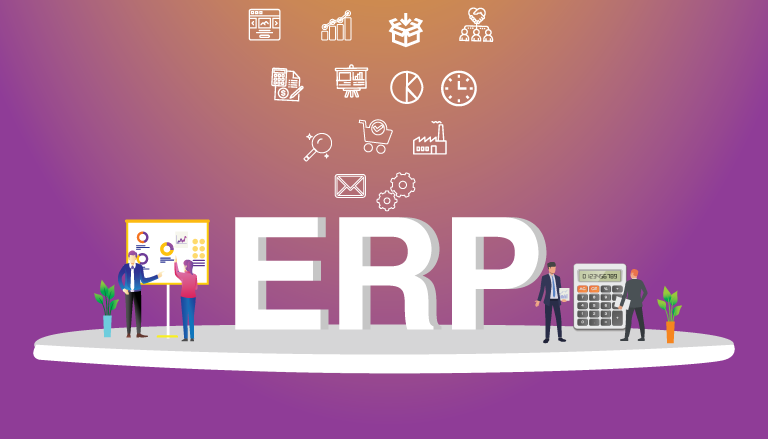How did the Enterprise Resource Planning (ERP) System emerge?
Enterprise Resource Planning (ERP) systems represent a revolution in the world of business management, providing a comprehensive solution for organizing and managing all aspects of operations within organizations. In this article, we will take a look at the history of its emergence, explore its benefits and advantages, as well as review common applications and present the best available solutions in this field.

Enterprise Resource Planning (ERP) systems represent one of the latest technological innovations that have fundamentally changed the nature of business management and planning. These systems are comprehensive and integrated tools designed to organize and manage all aspects of operations within organizations, ranging from production and supply to sales, marketing, and human resources management. The significance of these systems lies in their ability to improve work efficiency, increase productivity, reduce costs, and enhance the quality of products and services.
In this article, we will trace the history of the emergence of Enterprise Resource Planning systems and shed light on the benefits and advantages offered by this exceptional system. Additionally, we will explore common applications of ERP systems and highlight the best available solutions in this field. Understanding how this pioneering technology emerged and evolved helps us grasp its current importance and promising future in today's business world.

The history of the Enterprise Resource Planning (ERP) System
The history of Enterprise Resource Planning (ERP) System dates back to the 1980s, when the Gartner Group began using the abbreviation "ERP" to encompass concepts such as Material Requirements Planning (MRP), Manufacturing Resource Planning (MRP II), and Computer-Integrated Manufacturing. This period witnessed a significant evolution in the idea of enterprise resource planning, as companies started integrating resource planning components with finance, accounting, maintenance, and human resources.
By the mid-1990s, ERP systems had undergone significant development, covering all essential functions within the enterprise. Governments and non-profit organizations also began adopting these systems, and the "Enterprise Resource Planning System Selection Methodology" became an official process for selecting the best solutions.
ERP systems transcended internal corporate boundaries and began interacting with external systems, leading to the development of the concept of "ERP II" in 2000. ERP II aims to provide real-time access to ERP systems for employees and partners, expanding its scope to include Supply Chain Management, Customer Relationship Management, and Business Intelligence among partner enterprises.
Currently, developers are focusing on integrating mobile devices with ERP systems, enhancing their flexibility and capability to communicate and interact in modern work environments. Technical challenges related to modern ERP system planning confront companies with integrating hardware, applications, networks, and supply chains, requiring adaptation to globalization, transparency, and stakeholder relations requirements.

Benefits and Advantages of the Enterprise Resource Planning (ERP) System
- Comprehensive Integration: The ERP system provides comprehensive integration of all company operations through a single software unit, facilitating the exchange of information and data between different departments and aiding in achieving effective coordination.
- Increased Efficiency: The ERP system contributes to improving work efficiency by reducing manual and repetitive operations, allowing resources and efforts to be directed towards more valuable activities.
- Informed Decision Making: The ERP system provides unified and accurate real-time information, assisting leaders and managers in making better data-supported decisions.
- Cost Reduction: Through improved efficiency and waste reduction, the ERP system can deliver cost savings across the enterprise.
- Improved Customer Service: By providing quick access to centralized information, customer service teams can deliver better and more efficient service to customers.
- Effective Monitoring and Control: The ERP system provides mechanisms for effectively monitoring and controlling operations and performance, facilitating the detection and resolution of issues in a timely manner.
- Compliance and Conformity: The ERP system can assist organizations in complying with local and international legislation and regulations by providing mechanisms for compliance management and tracking.
- Scalability and Growth: The ERP system can expand the scope of work and enter new markets thanks to its ability to handle various types of operations and businesses.
In summary, the Enterprise Resource Planning (ERP) System is a powerful tool for improving business management, enhancing efficiency, and achieving sustainable growth in the modern competitive environment.

Common Applications of the Enterprise Resource Planning (ERP) System
- Logistics and Supply Chain Management: ERP systems are used to improve logistics management and organize the supply chain. Companies can track inventory, coordinate shipments, and enhance transportation processes, leading to increased delivery efficiency and cost reduction.
- Financial and Accounting Management: ERP systems help simplify and organize financial and accounting processes within the organization, enabling managers to have a comprehensive view of financial data and make decisions based on accurate information.
- Customer Relationship Management (CRM): ERP systems can integrate customer relationship management functions into an integrated environment, allowing organizations to analyze customer data, track interactions, and improve customer service comprehensively.
- Human Resources Management: ERP systems provide an integrated module for human resource management, including payroll management, recruitment, performance evaluation, and skill development, facilitating employee management and performance improvement.
- Reporting and Analytics: ERP systems enable the creation of customized reports and accurate analytics based on the data available in the system, facilitating strategic decision-making and improving work performance.
- Production Management: ERP systems enhance production operations management by organizing scheduling, materials management, and tracking production costs, thereby increasing production efficiency and product quality.
- Administrative Management: ERP systems facilitate the management of administrative operations such as procurement, sales, purchases, and inventory management, improving workflow organization and facilitating the flow of administrative operations.

The Best Enterprise Resource Planning (ERP) System
Among the many Enterprise Resource Planning (ERP) systems available in the market, I-Zone system offered by CodeZone stands out as one of the best solutions available. I-Zone ERP System is considered a comprehensive and effective solution for managing all aspects of business operations within an enterprise in an integrated and coordinated manner.
I-Zone platform boasts a wide range of features and functionalities that cater to the needs of various industries and companies. This includes production, inventory management, supply chain, sales, as well as financial management, accounting, and customer relationship management. The I-Zone ERP system provides the capability to generate custom reports and accurate analytics to aid in making strategic decisions based on data.
Moreover, I-Zone system is known for its user-friendly interface and web-based accessibility, making it easy to access and work with from anywhere and at any time. It also offers continuous technical support and regular updates to ensure the continuity of high efficiency operation.
In summary, I-Zone ERP System is among the top solutions in the market for enterprise resource planning, combining strength, versatility, and ease of use, making it an ideal choice for companies seeking to improve performance and enhance effectiveness in today's business landscape.

Conclusion
Considering Enterprise Resource Planning (ERP) System as one of the most crucial modern technologies in the business world, its benefits and advantages extend beyond merely enhancing efficiency within organizations. They also encompass achieving comprehensive integration in all aspects of operations, enhancing communication, and coordination among different departments and employees. ERP contributes to streamlining processes, reducing costs, increasing productivity, and providing valuable strategic insights to help companies make informed, data-driven decisions.
With the continuous evolution in this field and a focus on improving integration and communication among various business systems, the role of ERP systems is expected to continue advancing and innovating in the field of business management. With its widespread use across different industries and companies, ERP systems are essential in achieving success and competitiveness in the modern market.
In this context, investing in an Enterprise Resource Planning (ERP) System represents a vital investment for companies, aiding them in adapting to the continuous changes in the business environment and successfully achieving their strategic objectives


